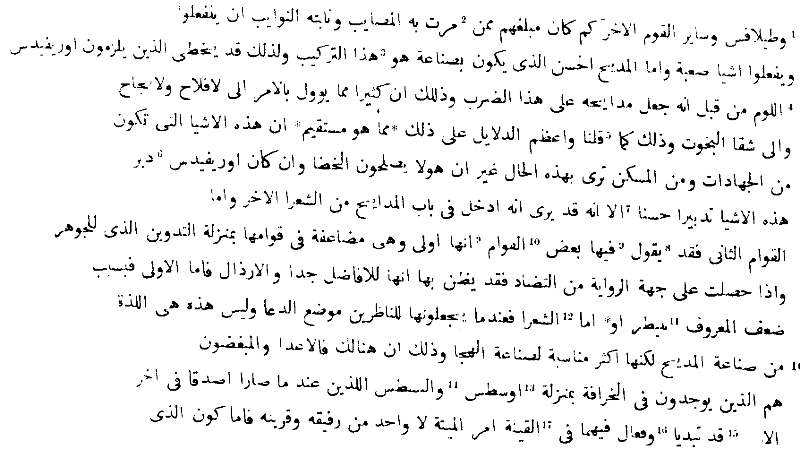Аристотель «Поэтика»: Что вызывает сострадание и страх: события (1453a12)
Перевод М. Гаспарова
[a22] Итак, с точки зрения искусства лучшая трагедия — это <трагедия> именно такого склада. Поэтому ошибаются те, кто винит Еврипида за то, что он так делает в своих трагедиях, и многие трагедии имеют у него худой конец. [a26] Это, как сказано, правильно; а лучшее тому доказательство — в том, что на сценах и в состязаниях именно такие трагедии кажутся трагичнейшими, если правильно выполнены, и Еврипид кажется трагичнейшим из поэтов, даже если в остальном у него не все ладно. [a30] А на втором месте находится тот склад <трагедии>, который иные считают первым: двойной склад, как в «Одиссее», и с противоположным исходом для хороших и для дурных. [a33] Первою такая трагедия кажется лишь по слабодушию зрителей, — ведь поэты <часто> следуют за зрителями и поступают им в угоду. [a35] <В действительности же> удовольствие такого рода свойственно не трагедии, а скорее комедии: ведь это там даже злейшие враги по сказанию, как Орест и Эгисф, уходят под конец <со сцены> друзьями, и никто ни от кого не умирает.
Перевод В. Аппельрота
Итак, лучшая, согласно законам искусства, трагедия есть трагедия такого именно состава. Поэтому ошибаются порицающие Еврипида за то, что он делает это в своих трагедиях и что многие из них кончаются несчастьем: это, как сказано, правильно. Лучшее доказательство тому: на сценах и состязаниях самыми трагическими оказываются именно такие трагедии, если только они хорошо поставлены, и Еврипид, если даже в прочем и не хорошо распоряжается [своим материалом], оказывается все- таки трагичнейшим из поэтов.
А второй род трагедии, называемый некоторыми первым, есть тот, который имеет двойной состав, подобно «Одиссее», и оканчивается противоположно для лучших и худших людей. Кажется же она первой по слабости театральной публики: ведь поэты приноравливаются к зрителям, поступая им в угоду. Но удовольствие, [получаемое] при этом, присуще не трагедии, а скорее комедии; тут, действительно, те, которые по фабуле были злейшими врагами, как Орест и Эгисф, под конец оказываются друзьями и ни один не умирает от руки другого.
Перевод Н. Новосадского
Таков состав лучшей трагедии согласно требованиям нашей теории. Поэтому допускают ту же ошибку и те, кто упрекает Еврипида за то, что он делает это в своих трагедиях и что многие его трагедии оканчиваются несчастьем. Но это, как сказано, правильно. И вот важнейшее доказательство: на сцене, во время состязаний, такие произведения оказываются самыми трагичными, если они правильно разыграны. И Еврипид, если даже в других отношениях он не хорошо распределяет свой материал,
Второй вид трагедии, называемый некоторыми первым, имеет двойной состав событий, так же как «Одиссея», и в конце ее судьба хороших и дурных людей противоположна. Этот вид считается первым по слабости публики, так как поэты подчиняются в своих произведениях вкусам зрителей. Однако так вызывать удовольствие чуждо трагедии, это более свойственно комедии. Там герои, хотя бы они были злейшими врагами по мифу, как, например, Орест и Эгист, в конце уходят со сцены друзьями, и никто никого не убивает.
Translated by W.H. Fyfe
Judged then by the theory of the art, the best tragedy is of this construction. Those critics are therefore wrong who charge Euripides with doing this in his tragedies, and say that many of his end in misfortune. That is, as we have shown, correct. And there is very good evidence of this, for on the stage and in competitions such plays appear the most tragic of all, if they are successful, and even if Euripides is in other respects a bad manager, yet he is certainly the most tragic of the poets.
Next in order comes the structure which some put first, that which has a double issue, like the Odyssey, and ends in opposite ways for the good characters and the bad. It is the sentimentality of the audience which makes this seem the best form; for the poets follow the wish of the spectators. But this is not the true tragic pleasure but rather characteristic of comedy, where those who are bitter enemies in the story, Orestes and Aegisthus, for instance, go off at the end, having made friends, and nobody kills anybody.
Translated by S.H. Butcher
In the second rank comes the kind of tragedy which some place first. Like the Odyssey, it has a double thread of plot, and also an opposite catastrophe for the good and for the bad. It is accounted the best because of the weakness of the spectators; for the poet is guided in what he writes by the wishes of his audience. The pleasure, however, thence derived is not the true tragic pleasure. It is proper rather to Comedy, where those who, in the piece, are the deadliest enemies — like Orestes and Aegisthus — quit the stage as friends at the close, and no one slays or is slain.
Translated by I. Bywater
Traduction Ch. Emile Ruelle
V. Voici un fait qui le prouve. A l’origine, les poètes racontaient n’importe quelles fables; mais, aujourd’hui, les meilleures tragédies roulent sur des sujets empruntes à l’histoire d’un petit nombre de familles, comme, par exemple, sur Alcméon, Oedipe, Oreste, Méléagre, Thyeste, Télèphe et tous autres personnages qui ont fait ou éprouvé des choses terribles.
VI. Tel sera donc le mode de constitution de la tragédie la meilleure, selon les règles de l’art. Aussi
VII. La seconde espèce, mise au premier rang par
VIII. Elle paraît occuper le premier rang, à cause de la faiblesse d’esprit des spectateurs; car les poètes s’abandonnent, dans leurs créations, au goût et au désir de leurs spectateurs.
IX. Du reste, ce n’est pas là l’intérêt que l’on puise dans la tragédie; c’est plutôt celui qui appartient à la comédie. Là, en effet, des personnages donnés par la fable comme les plus grands ennemis, tels qu’Oreste et Égisthe, en arrivent à être amis sur la fin de la pièce, et personne ne donne ni ne reçoit la mort.

